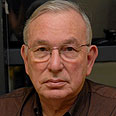
Israelis’ obsession with generals
Opinion: The Blue and White Party includes a disproportionate amount of ex security officials and although Israel is not Latin America, the military still wields too much power in local politics. The electorate ought to be more wary of the enchantment of the uniform.
In their speeches during the launch of their party, Benny Gantz and Yair Lapid obeyed the rule put forward by Eugene McCarthy, the American senator who failed several times in his attempts to be elected president: "It is dangerous for a national candidate to say things that people might remember."
Indeed, none of those speeches will be remembered, but the picture taken will surely be engraved in our memory: four strong men, three generals and one journalist, challenge the prime minister because of the friction he has caused among the population. How will the four heal a deeply divided public? They believe that their ability stems from their very personality. But it will not suffice to heal a sociological crisis that Netanyahu did not create, although he is good at exploiting it.
In addition to the three army commanders, 30 of the leading candidates on their list include a number of others who have served in senior positions in the security forces: generals, two police dep. inspectors and the deputy head of the Mossad. If so, no less than half of the leading candidates of the Blue and White Party are "security experts," but do we need so many?
Of course we don’t. Military officers, as senior as they may be, are not necessarily security experts. They are experts in managing an organization that aims to defeat the enemy on the battlefield, but this ability is only one of the components that politicians are responsible for. The “amazing three” and their accompanying group of career security men and women have yet to prove that they possess the qualities required of national leaders. They have not even revealed their positions on critical issues and I would not be surprised if behind the facade there is merely a block of malleable clay.
What does their political success say about Israeli society? The intuitive association is of Latin America. Since their liberation from European rulers, generals and admirals have controlled most of the countries of the continent, and even when they did not openly rule, they have strongly influenced the government.
One of the reasons for this is the perception of the military as responsible for uniting a fragile nation. Ostensibly, the military is a neutral body from an ethnic and class perspective. The name of the party, Blue and White, is not coincidental: the national flag is the wedding canopy under which the leaders tie the knot with the nation’s citizens.
True, Israeli democracy, flawed as it may be, is not like the regimes of South America, and its military is not like their militaries. The elections are not a sham, the army obeys the political echelon, and a military coup is highly unlikely. The similarity is that the military establishment is much too important a player in the political system.
Generations of Finance Ministry officials will testify that the heads of the army have too much power in determining the size of the defense budget and the salaries of its members. It is reasonable to assume that a government, many of whose ministers were members of the defense establishment until recently, would tend to comply with the demands of their heirs in the command; although it is possible that their in-depth knowledge of the organization's affairs will allow the new politicians to better scrutinize and reject excessive demands. I am inclined to the first assumption.
It is clear that the attractiveness of senior military personnel stems from the feeling that their long service in uniform proves their patriotism and that the fate of the country is more important to them than their own good. They lay in ambushes, languished in the mud, exposed their chests to the enemy's bullets, and rarely saw their families while most of the population was at home. Their associates and subordinates were drawn from across the national spectrum and they therefore represent the overall Israeliness.
But people change quickly. Senior officers who move into the business world behave like businessmen, honest or crooks, and military personnel who move into the political world behave like politicians, with integrity or lack of integrity. The electorate is advised to be wary of the enchantment of the uniform.



















